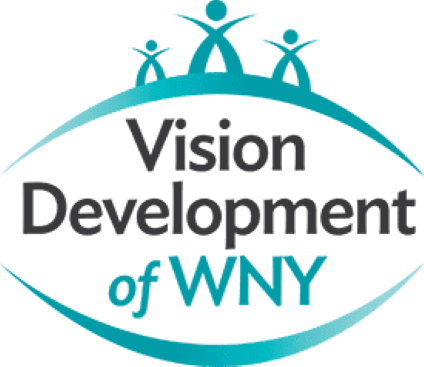Binocular Vision Dysfunction
Binocular Vision Dysfunction Treatment in Western New York
At Vision Development of WNY, we provide expert care for those affected by binocular vision dysfunction (BVD). Our experienced behavioral optometrists use advanced diagnostic and treatment methods to help you see the world clearly.
What is Binocular Vision Dysfunction?
Binocular visual dysfunction (BVD) occurs when your eyes struggle to work together as a team sending separate images to the brain. With BVD, the eye muscles and the brain will strain to correct the misalignment between the eyes and the brain. This effort to see one clear image often results in:
- Headaches or Migraines
- Dizziness or Balance Difficulties
- Eye Strain or Fatigue
- Seeing double or Blurred Vision
- Reading problems
- Difficulty with depth perception
- Sensitivity to Light
- Nausea
- Anxiety
- Neck Pain
- Tension
Binocular Vision Dysfunction Affects All Ages
However, skipping developmental milestones such as crawling is one of the most common causes of binocular vision dysfunction that we treat at Vision Development of WNY.
Why Crawling Matters
If you suspect that your child may have BVD, or if they have not met developmental milestones like crawling, it's important to consult a Behavioral Vision Optometrist. Early intervention can prevent long-term consequences, support your child's visual health, and allow a child to see, read, and meet the academic, social, emotional, and physical demands of school and sports.

Diagnosing Binocular Vision Dysfunction
Because someone with BVD may compensate through strain and struggle to see one image but otherwise possess “good eyesight” (20/20 eyesight), general practitioners, ophthalmologists, and even neurologists may misdiagnose the symptoms present and BVD can go undetected.
Identifying BVD requires specialized testing that goes beyond standard eye exams. At Vision Development of WNY, our behavioral optometrist uses state-of-the-art technology to evaluate your eye coordination, eye teaming, tracking, and focusing to diagnose BVD accurately. Our comprehensive functional vision evaluation includes:
- A detailed analysis of your visual skills and eye movements
- Tests to assess your ability to focus and track objects
- An evaluation of your binocular coordination and autonomic nervous system (balance)
Treating Binocular Vision Dysfunction
The Behavioral Optometrists at Vision Development of WNY are experienced in diagnosing and treating patients with Binocular Vision Dysfunction. The good news is that BVD is treatable. Our experienced optometrist specializes in designing personalized treatment plans tailored to your specific needs. Treatment may involve:
- Vision therapy techniques to improve eye coordination and other visual skills
- Syntonic Phototherapy to improve balance in the body’s regulatory centers
- Corrective lenses or prism glasses to bring focus and pointing of the eyes into balance and reduce symptoms
- Ongoing support and follow-up to monitor progress and adjust treatment as needed
DIFFERENTIAL DIAGNOSIS
BVD symptoms, behaviors, or challenges are commonly associated with or mistaken for other conditions.
This can lead to misdiagnoses, where vision issues are mistaken for learning or attention disorders rather than symptoms of a correctable functional vision problem. These conditions include:
- ADHD
- Dyslexia
- Anxiety
- Migraines
- Other Developmental or Learning Disorders
Vision Therapy & Binocular Vision Dysfunction Treatment
With the right approach and techniques, vision therapy can significantly improve, and reduce (if not completely remove) the symptoms associated with Binocular Vision Dysfunction. Vision Development of WNY takes a personalized approach and tailors therapy to each patient to train and develop brain-eye communication. Vision therapy treatment can last for a few weeks or months, depending on the severity of the issue, and will improve eye alignment, tracking, and teamwork. Get Started on the path to a better vision today!
Ready To Get Started Treating BVD?
At Vision Development of WNY, our experienced Behavioral Optometrists diagnose and treat Binocular Vision Dysfunction to help you see the world clearly.
Call us to schedule a functional vision evaluation today. We look forward to helping you or your loved one achieve their full potential, which can lead to increased success, confidence, and a higher quality of life. There’s Hope In Sight!
